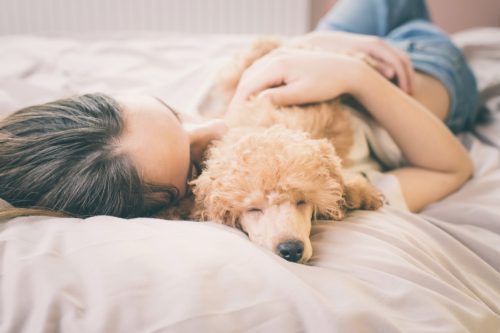One-Third of Pet Owners Can’t Do This, New Study Says

Dogs may be referred to as man’s “best friend,” but for many pet owners, the relationship is more like that of family. And the bond between a pet owner and their furry family member is often so strong that many owners are willing to make various sacrifices for their animal’s sake. In fact, a new study has pinpointed a major thing that many are willing to go without for their four-legged companions. Read on to find out what one-third of pet owners say they can’t do because of their pets.
READ THIS NEXT: Half of Pet Owners Say They’d Dump Their Partner Over This, New Study Says.
Pet owners are willing to make a lot of sacrifices for their animals.

Some owners love their pets so much that they’re willing to make the ultimate sacrifice for them. Nearly one in four pet owners say they would actually sacrifice their own lives to save their dog, according to a survey from Rowan. But even if you’re not willing to go that far, chances are you would still make certain significant changes for your pet.
In 2018, 79 percent of Americans said they would stop eating at restaurants to pay for pet-related expenses if they were in a difficult financial situation, while 67 percent said they’d give up their vacation, 61 percent said they’d sacrifice their cable and streaming services, and 35 percent would even sacrifice their cell phone plan to do the same.
Now, a new survey shows yet another way in which pet parents are willing to put their animals’ needs before their own.
A third of owners say they can’t do one thing because of their pets.

It’s clear that pet owners are willing to sacrifice a lot for their furballs, and it seems a good night’s sleep is no exception. A recent survey of 2,000 U.S. adults conducted by OnePoll on behalf of Serta Simmons Bedding looked into what common problems appear to be disrupting people’s sleep. And according to the study, a significant percentage of pet owners regularly can’t sleep through the night.
The researchers found that 36 percent of pet owners report being awoken by their pet barking, meowing, or whimpering at least two times every week. At the same time, 31 percent said they get woken up this much by their pet needing to go outside, while 30 percent said they can’t sleep every night because their pet takes up too much space in the bed.
Many people let their pets sleep in the same bed as them.

Many people’s nightly routine includes snuggling up to their furry friends. A 2022 survey from the American Academy of Sleep Medicine (AASM) found that 46 percent of all pet owners sleep in the same bed with a pet. Only about 19 percent of those who allow their pet to sleep with them say they sleep worse because of it. In fact, 46 percent actually claim to sleep better with their pet in the same bed.
This is likely because people have different perceptions, according to Andrea Matsumura, a member of the AASM’s Public Awareness Advisory Committee and a sleep specialist in Portland, Oregon. “Healthy sleep looks different from person to person. Many pet owners take comfort in having pets nearby and sleep better with their companion by their sides,” she explained in a statement.
On the other hand, “sleeping with an animal may come with risks for some people,” the Sleep Foundation warns. According to the organization, having a pet in the bed can affect sleep quality, allergies, risk of disease, and safety.
For more pet advice delivered straight to your inbox, sign up for our daily newsletter.
But interrupted sleep can have a negative impact on your health.

All in all, the Sleep Foundation says that “choosing to sleep with an animal is a personal decision” that pet owners should make based on “whether the benefits outweigh the risks [for] you, your pet, and your unique situation.”
But no matter your preference, Matsumura said there is one piece of guidance you should always adhere to: “For most adults, whether you sleep with a pet or not, it is important that you get seven or more hours of restful sleep each night for optimal health.”
This is because interrupted sleep can have a negative impact on your overall health. According to a 2017 study in the Nature and Science of Sleep journal, sleep disruption in otherwise healthy adults can cause short-term consequences such as “increased stress responsivity, somatic pain, reduced quality of life, emotional distress and mood disorders, and cognitive, memory, and performance deficits.” And when looking at long-term effects, people who are experiencing consistently interrupted sleep may go on to develop hypertension, heart disease, dyslipidemia, weight-related issues, type 2 diabetes, and even colorectal cancer.